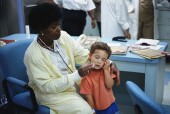
MONDAY, March 22 (HealthDay News) — U.S. health officials recommended Monday that doctors temporarily stop using the Rotarix vaccine — one of two brands available to prevent the diarrhea bug rotavirus — for children until the source and any potential harm from a contamination of the vaccine has been identified.
Doses of the oral vaccine appear to be contaminated with a benign pig virus, according to officials at the U.S. Food and Drug Administration.
The recommendation comes after independent researchers found porcine circovirus 1 (PCV1) in Rotarix. This virus is not known to cause illness in humans, FDA Commissioner Dr. Margaret Hamburg said during an afternoon teleconference.
“There is no evidence at this time that this material from PCV1 in Rotarix poses any safety risk,” Hamburg said. “PCV1 is not known to cause any disease in humans or animals.”
Still, vaccines are supposed to be sterile and although Rotarix has a good safety record, finding PCV1 in the vaccine was unexpected, Hamburg said. Rotarix, made by drug giant GlaxoSmithKline, was licensed in 2008.
“While the agency is learning more about the situation, FDA is recommending that clinicians temporarily suspend the use of Rotarix vaccine,” Hamburg said.
Rotavirus is a common cause of severe diarrhea among children, hospitalizing approximately 55,000 children each year in the United States. The virus is responsible for more than 600,000 children’s deaths each year worldwide. The disease causes vomiting and watery diarrhea for three to eight days, along with fever and abdominal pain, according to the U.S. Centers for Disease Control and Prevention.
Hamburg said that PCV1 may have been present in Rotarix since the vaccine was developed. The contamination was found by independent researchers using new virus-spotting technology, she said.
Follow-up FDA analysis has confirmed the presence of PCV1 in Rotarix, Hamburg added. “FDA is investigating how the PCV1 DNA came to be present in the vaccine,” she said.
The other vaccine available to protect against rotavirus is RotaTeq, also delivered by mouth and made by Merck. RotaTeq was licensed by the FDA in 2006 so most children vaccinated in the United States received RotaTeq, Hamburg said.
RotaTeq is made using a different method, she noted. “Preliminary tests on the RotaTeq vaccine by an academic research team and FDA have not shown the presence of PCV1 DNA,” Hamburg said.
RotaTeq requires three doses while Rotarix requires two. That means that children who have already gotten one shot of Rotarix should now get two shots of RotaTeq to be fully vaccinated, Hamburg said.
She stressed that the the FDA recommendation applies only to the United States. Other countries where rotavirus is more common and severe may choose to continue recommending Rotarix. “Such a decision would be very understandable,” she said.
In several weeks, the FDA is having an expert advisory committee meeting to make additional recommendations on the use of rotavirus vaccines, Hamburg said.
Thomas Breuer, head of global clinical R&D and chief medical officer of biologicals at GlaxoSmithKline, said in a statement that, “no safety issue has been identified by external agencies or GSK. GSK is committed to patient safety and to the highest manufacturing standards for all our vaccines and medicines. We are already working closely and discussing this finding with regulatory agencies around the world.”
“GSK is now reviewing how best to replace, in a timely way, the cell bank and virus seeds used as base production material. In the meantime, and in accordance with the regulators, the company will continue to manufacture Rotarix to the existing approved production and quality standards to meet public health needs worldwide,” the company added.
More information
For more on rotavirus, head to the U.S. Center for Disease Control and Prevention.

